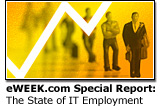10 Hot Jobs for 2007 by CareerBuilder.com
As the world continues to advance and change technologically, we are living longer, retiring later and pursuing higher education at a higher rate than generations before us, and the employment market is changing right alongside us.
According to the Bureau of Labor Statistics, technology is just one of the few factors in determining what's going to be the next great gig out there. Demographic shifts, legislative changes, business trends and consumer behavior also factor into what's going to be the next big thing and what's going to be history.
Here are some of today's jobs that are on the cutting edge:

1. Radiation Therapist
What they do: Work with radiation oncologists to administer treatment as prescribed and supervised by the doctor. They also maintain records and check the operations of the radiology equipment.
What you need: An associate or bachelor's degree in radiology and certification under the American Registry of Radiologic Technologists. Licensing may also be required.
2. Nurse Paralegal
What they do: Similar to LNCs, they are hired to assist law firms, government agencies and insurance companies with expertise on medical-related cases. Unlike LNCs, nurse paralegals have a stronger focus on the legal relations to medicine.
What you need: A bachelor's or advanced degree in nursing or another health-related field and certification.
3. Genetic Counselor
What they do: Assist families who have members with birth defects and other genetic disorders, and also aid in educational and administrative roles related to genetic counseling and inherited health issues.
What you need: A bachelor's degree concentrating on biology/biosciences, psychology, genetics or nursing and a master's degree in genetic counseling. The American Board of Genetic Counseling and the American Board of Medical Genetics offer certification.

4. Legal Nurse Consultant
What they do: Perform an analysis of medical information as related to law. They conduct legal research, interview expert witnesses and assist with legal paperwork and processes.
What you need: An RN license. Formal training as a legal nurse consultant (LNC) is not required, but helpful.
5. Art Therapist
What they do: Treat physical, mental and emotional disabilities through art expression.
What you need: A master's degree in art therapy with completed curriculum under the American Art Therapy Association's educational standards. To be a registered art therapist, 1,000 hours of direct client contact must be reached after graduation.
6. Computer Forensic Expert
What they do: Use computer investigation and analysis to determine legal evidence. They uncover deleted information and can help the legal system track down people attempting to cover their illegal actions, such as hackers and inside traders.
What you need: A wide range of computer hardware and software experience, as well as an associate or bachelor's degree in computer forensics, computer science or another related field.
7. Medical Illustrator
What they do: Create images that visually communicate bioscientific and medical discoveries. They also act as consultants, advisers, administrators and educators in biological science communications.
What you need: A bachelor's degree with a major in art and a minor in biological sciences or vice versa; a portfolio of artwork demonstrating competence. A majority of medical illustrators have master's degrees in medical illustration.
8. Veterinary Physical Therapist
What they do: Focus on animal treatment and rehabilitation methods, including hydrotherapy, swimming, exercise and massage.
What you need: Certification training is offered to licensed veterinarians, veterinary technicians and physical therapists. Some certification programs require written exams, and follow-up case reports, independent studies and take-home exams are also available.
9. Animal Defense Lawyer
What they do: Handle cases dealing with animals in cases ranging from custody in divorce cases to veterinary malpractice. While laws suggest that animals are regarded as "property," owners who are battling for the custody often regard their pets at a higher standard.
What you need: The educational degrees and requirements for a major in law, a Juris Doctorate, and a concentration and clinical work in animal law.
10. Animal Assisted Therapist
What they do: Study and identify behavioral patterns in animals and apply techniques to improve mental, social and physical issues within humans through animal/human companionship.
What you need: A bachelor's of science degree in psychology, social work, physical therapy, nursing or education. Additional training and certification in Animal Assisted Therapy (AAT) is a big plus. AAT program concentrations can include elderly care, social work, education and other specialties.
Candace Corner is a writer for CareerBuilder.com.
Cheers,
The Singapore Headhunter







































